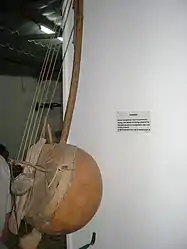Simbing
The simbing is a Malian harp-lute, used by the Mandinka people of Mali, and the Mandinka and Jola peoples of Senegal and Gambia.[2][3] The instrument consists of a calabash resonator, a (usually curved) stick for a neck, a metal jingle attached to the neck, and a bridge that holds the string over the skin soundboard in a vertical line.[2] For comparison, lutes (such as the guitar) usually have the strings held in a horizontal line above the soundboard. The instrument has five to nine strings. A simbing from the 1790s was reported as having seven strings by Mungo Park.[4]
 A simbing in Bakau Crocodile Museum, Gambia | |
| String instrument | |
|---|---|
| Other names | |
| Classification | harp-lutes |
| Hornbostel–Sachs classification | 323-5 (Acoustic instruments which have a resonator as an integral part of the instrument, in which the plane of the strings lies at right angles to the sound-table; a line joining the lower ends of the strings would be perpendicular to the neck. These have notched bridges. Sounded by the bare fingers) |
| Related instruments | |
The instrument was played in the Mandinka and Jola cultures in the context of hunting.[2] With the Mandingas, the instrument was played by "the hunter's musician" who narrated songs about the hunt and the animals.[2] With the Jolas, the instrument is used to accompany men singing in groups.[2]
In addition to the instrument's strings being plucked, its calabash gourd could also be tapped with sticks by the singer, to produce a percussive effect.[2]
References
- Wallaschek, Richard (1893). Primitive Music. London and New York: Longmans, Green and Co.
...the Mandingoes have a harp, "korro" with eighteen strings, and another, "simbing," with seven strings...
- Durán, Lucy. "Simbing". In Sadie, Stanley (ed.). The New Grove Dictionary of Musical Instruments. Vol. 3. p. 387.
- Simbing (plaque inside museum). Bakau, Gambia: Bakau Crocodile Museum. Retrieved 19 October 2022.
SIMBING Seven-string bow-harp in pentatonic tuning, one plane of string, played by the Jola people in Senegambia who call it also Furakaf. In Mall Bamana who call it simbi plays it.
- Park, Mungo (1893). Travels in the Interior Districts of Africa, 1795-1797.
add a list of their musical instruments, the principal of which are—the koonting, a sort of guitar with three strings; the korro, a large harp, with eighteen strings; the simbing, a small harp with seven strings...